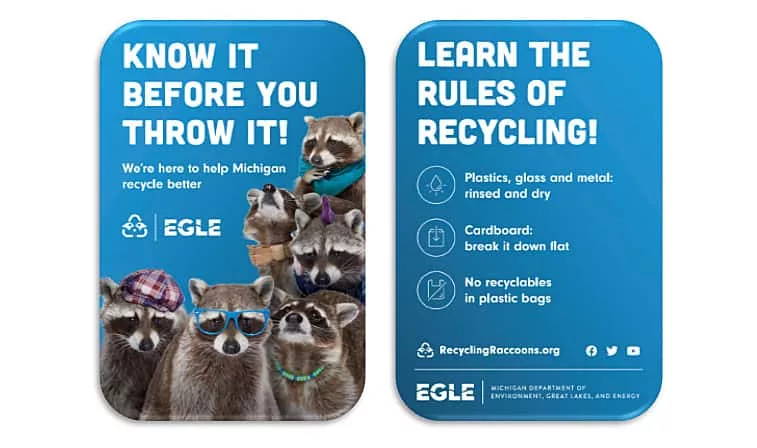Most of us make at least a half-hearted effort to do the right thing through some form of recycling. Even if that’s just taking beverage bottles back to the store for a deposit or once a year hitting the big recycling efforts hosted by local government agencies and the like. Then, too, there are the curbside recyclers who try to do what’s right, but not everyone even understands what can be recycled and what cannot.
To help everyone in Michigan understand proper methodology, the Michigan Department of Environment, Great Lakes, and Energy — EGLE — has kicked off a major new educational campaign called Know It Before You Throw It. Essentially, it is the first-ever effort to promote cleaner recycling in the state.
EGLE’s goal is to promote awareness of cleaner recycling practices to reduce the amount of contaminated materials improperly going into recycling bins. The state also wants to double Michigan’s recycling rate to 30-percent by 2025 and ultimately reach 45-percent annually. Michigan’s current 15-percent recycling rate is the lowest in the Great Lakes region and ranks among the nation’s lowest, as well.
The Know It Before You Throw It campaign launches as communities across Michigan and the U.S. are struggling with international market shifts, resulting in higher costs for some local governments that fail to meet new industry-wide cleanliness standards for recyclable materials.
Jack Schinderle is EGLE’s Division Director of Materials Management. He says, “We want to inform and inspire more people than ever before in Michigan about how to recycle better,” and adds, “This campaign is a first of its kind for Michigan that offers multiple benefits. Increasing recycling and improving the quality of materials we’re recycling saves energy, reduces water use, decreases greenhouse gases, conserves resources and translates into local jobs.”
EGLE officials were joined during a Monday news conference at a Lansing recycling transfer station by East Lansing Mayor Mark Meadows; Lansing Deputy Mayor Samantha Harkins; state Sen. Curtis Hertel Jr., D-East Lansing; state Rep. Sarah Anthony, D-Lansing; state Rep. Kara Hope, D-Lansing; state Rep. Julie Brixie, D-East Lansing; Michigan Recycling Coalition Executive Director Kerrin O’Brien; and Michigan Waste and Recycling Association Board Chair Kevin Kendall.
Meadows said, “We thank Gov. Whitmer, the Michigan Legislature and EGLE for their leadership and for working together to develop a strategy that will help improve and sustain Michigan’s environment now and throughout the 21st century.”
Recycling in Michigan is receiving a major boost as state legislators in an overwhelmingly bipartisan move have increased EGLE’s funding for recycling from $2-million last year to $15-million in 2019. The extra funds will support development of recycling markets, increase access to recycling opportunities and reinforce planning efforts to grow recycling at the local level.
Hertel says, “What’s really great about EGLE’s campaign is that we’ve spent the past decade or more stressing the importance of putting more resources into recycling education and supporting local communities’ programs,” adding, “Michigan is now putting words into action.”
To kick off the campaign, EGLE introduced the Michigan Recycling Raccoon Squad, a six-member team of recycling champions who will serve as EGLE’s education ambassadors. EGLE-commissioned research shows that education is key for residents to learn how to properly recycle. For example:
- 50-percent of Michigan residents mistakenly believe they’re allowed to recycle plastic bags in their curbside recycling, which is prohibited by most municipalities.
- 76-percent of Michiganders are unaware that failing to rinse and dry items before putting them in the recycling bin poses a risk of contaminating everything in the bin.
Kendall tells us, “Some of the material being disposed of through landfills and incinerators could be recycled or composted in most metropolitan communities without great difficulty.”
Michigan recycles more than 90-percent of bottles and cans, but bottles and cans represent only 2-percent of all the waste Michiganders recycle every year. Almost 53-percent of the state’s municipal solid waste goes to landfills instead of recycling facilities. Lansing and East Lansing, for example, recycle nearly 7,500 tons of waste annually. While the cities have a relatively low contamination rate of 8- to 10-percent, that number is on the rise, according to data provided by both municipalities.
Harkins suggests, “By encouraging people to focus on the basics and think about what they’re recycling before they toss it, we can improve our environment and build stronger communities.”
Five decades have passed since Michigan’s historic accomplishment with the bottle deposit legislation earned the state national recognition as an environmental champion.
O’Brien cautions, however, “Over that time, Michigan has gotten complacent,” and adds, “We can – and must – become America’s leaders again in recycling. The EGLE campaign is a tremendous opportunity for Michigan to advance to the next level of performance in protecting our environment.”
You can find more information about the Know It Before You Throw It campaign by clicking this link: http://RecyclingRaccoons.org






